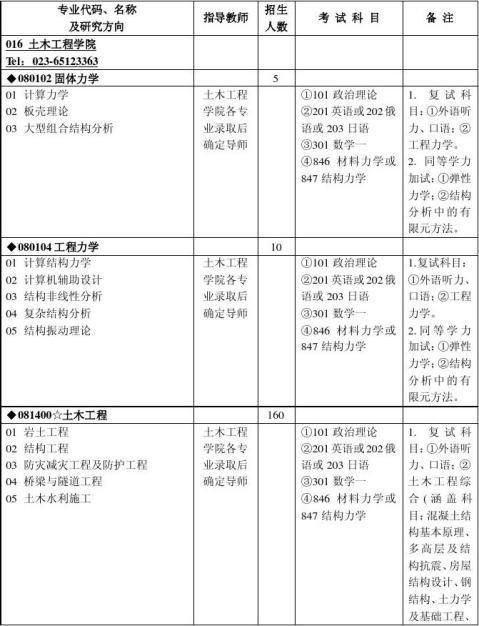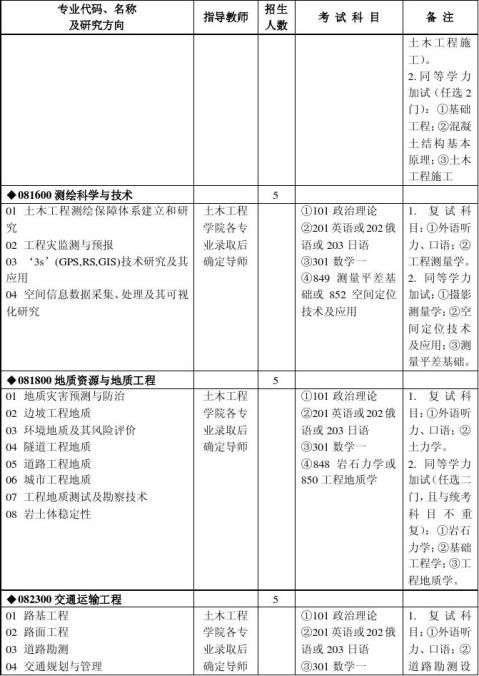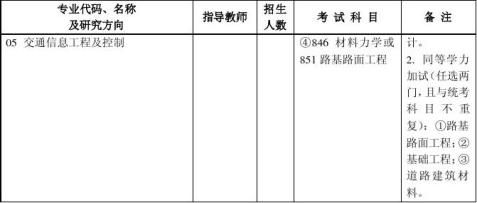重庆大学20xx年硕士研究生招生简章
重庆大学20xx年硕士研究生招生简章
(土木工程学院相关)
重庆大学是教育部直属全国重点大学,也是经教育部批准设立研究生院的高校、国家“211工程”和“985工程”重点建设的高校,是一所理、工、经、管、文、法、艺等多学科综合性重点大学。现有一级学科博士学位授权点16个,二级学科博士学位授权点88个(含28个自设专业),一级学科硕士学位授权点38个,二级学科硕士学位授权点182个。拥有工商管理硕士(MBA)、高级工商管理硕士(EMBA)、法律硕士(J.M)、工程硕士(含软件工程)、公共管理硕士(MPA)、会计硕士(MPAcc)、高等学校教师在职攻读硕士学位、风景园林硕士等专业学位授权点。热忱欢迎全国各地青年报考我校各类研究生。
一、招生规模
20xx年重庆大学招收各类硕士研究生(学历硕士)3700余名,其中含推荐免试、统考生、工商管理硕士(MBA)、法律硕士(J.M)、强军计划、少数民族高层次骨干人才计划等。
目录中招生规模和各专业招生人数仅供参考,以国家下达的20xx年研究生招生规模为准。本单位将保留根据国家下达的规模以及各专业上线生源情况对各专业招生人数进行调整的权力。
二、报考条件
(一)参加全国统一考试的报考条件
1、 拥护中国共 产 党的领导,愿为社会主义现代化建设服务,品德良好,遵纪守法。身体健康。考生年龄一般不超过40周岁,委托培养或自筹经费考生年龄不限。
2、 国家承认学历的应届本科毕业生(必须获得毕业证书)或往届本科毕业生。
3、 获得国家承认的大专毕业学历后两年或两年以上(从大专毕业到录取为硕士生当年9月1日)。
4、 国家承认学历的本科结业生和成人高校应届本科毕业生,按本科毕业同等学力报考。
5、 已获硕士学位或博士学位的人员,可以再次报考硕士生,但只能报考委托培养或自筹经费的硕士生。
(二)少数民族高层次骨干人才计划报考条件
⑴拥护中国共 产 党的领导,拥护社会主义制度,维护国家统一和民族团结,立志为西部大开发和民族地区发展服务。⑵国家承认学历的应届本科毕业生(必须获得毕业证书)或往
1
重庆大学20xx年硕士研究生招生简章
届本科毕业生;获得国家承认的大专毕业学历后两年或两年以上(从大专毕业到录取为硕士生当年9月1日)。⑶报考硕士研究生年龄不超过40周岁。⑷保证毕业后回定向地区(单位)就业,其中在职考生回原单位;非在职考生(含应届本科毕业生),全部回定向省、自治区、直辖市就业。
(三)强军计划报考条件
1、符合第二条(一)中的第1项要求。
2、国家承认学历大学本科毕业后连续工作4年或4年以上,业务优秀,已经成为业务骨干的在职人员,并属各军区推荐报考人员。
(四)工商管理硕士(MBA)专业学位报考条件
1、符合第二条(一)中的第1项要求。
2、大学本科毕业后(20xx年7月底前毕业)工作三年或三年以上。
3、大学专科毕业后(20xx年7月底前毕业)工作五年或五年以上。
4、研究生毕业学历并有两年或两年以上工作经验者。
5、工商管理硕士(MBA)只招收原单位委托培养或自筹经费培养考生。
(五)法律硕士(J.M)专业学位报考条件
1、符合第二条(一)中的第1项要求。
2、非法学专业的大学本科毕业生或应届本科毕业生。
3、非法学专业的大学专科毕业后(20xx年7月底前毕业)工作两年或两年以上。
4、法律硕士(J.M)只招收原单位委托培养或自筹经费培养考生。
5、下列13个专业的毕业生不得报考法律硕士(J.M):法学、经济法、国际法、国际经济法、劳动改造法、商法、公证、法律事务、行政法、律师、涉外经济与法律、知识产权法、刑事法。
(六)接收推荐免试生条件
1、一般是全国“211工程”学校(研究生院、“211工程”、“985工程”学校的优秀应届本科毕业生优先考虑)的优秀应届本科毕业生;学科专业全国排名名列前茅院校的优秀应届本科毕业生。对研究生院学校、“211工程”和“985工程”学校推荐来的推免生,将在提前攻读、硕博连读等方面予以优先支持。
2、需获得所在学校的推荐免试资格,推荐手续完备,材料齐全。
3、统考报名前通过我校的复试,成绩合格。在校期间各方面表现良好,身体健康,学习成绩优秀(学习成绩不能有不及格科目),未受到纪律处分、毕业设计(论文)良以上成
2
重庆大学20xx年硕士研究生招生简章
绩,毕业时能取得学士学位证书。
三、报名时间及地点
1、网上报名时间:20xx年10月10日-10月31日,网上报名网址:.cn或。
2、现场报名(摄像)时间:20xx年11月10日-11月14日。
3、报名考试地点:全国各地所设研究生报名考试点。重庆大学属重庆市所设报名考试点之一,报名地点:重庆大学(A区)研究生院一楼大厅。
4、根据教育部有关规定,现场报名时报名点只对考生有效身份证件进行核对,不对考生报考资格进行审查,请考生自审。资格审查在复试期间进行,凡不具备报考资格而参加报名者,造成遗留问题考生自行负责。对不符合报考条件或提供虚假信息的考生、考试舞弊等行为,按教育部《国家教育考试违规处理办法》严肃处理,不予录取。
四、报名程序
1、20xx年硕士研究生招生报名将继续试行网上报名与现场报名两个阶段。网上报名登录“中国研究生招生信息网”(.cn或)的“全国硕士研究生入学考试网上报名系统”,然后点击“进入网上报名”,并按要求完成网上报名操作。网报中,考生必须认真阅读教育部、省(市)招办、招生单位、报名考试点发布的相关公告。网上报名后考生本人还必须到报名点进行现场电子摄像并本人签字确认网报信息。
2、报名步骤:①仔细阅读报名网站的提示和要求;②按网站提示和要求,如实填写本人报考信息与所报考的专业名称及代码、院系名称及代码、考试科目名称及科目代码等;③认真核对所填报考信息;④确认无误后提交报考信息,提交报考信息后考生必须准确记录考生本人报考的“报名号”和密码;⑤考生本人修改报名信息仅限教育部规定的网报期间。
3、网上填报说明:
①凡报考重庆大学的硕士生在“备用信息1”栏填报“导师姓名”。
②报考强军计划的考生在“备用信息2”填写“强军计划”、“备用信息3”填写“推荐军区名称”。
③凡属国防生的考生无论是推免生或统考生必须在“备用信息2”栏注明“国防生”及保留资格年限。根据教育部、总政治部文件规定,国防生录取后必须保留1-2年入学资格,对未注明“国防生”和保留资格年限的,不能保留资格,责任自负。
4、考生网上报名后,符合报考条件的报名考生凭身份证(应届生还须带学生证)、报
3
重庆大学20xx年硕士研究生招生简章
名费、打印的网报信息表,于20xx年11月10日—11月14日到报名点现场报名,考生本人当场进行电子摄像,对打印的考生报考信息表由本人签字确认,签字确认的“考生报考信息表”必须交回报名点的收表处,否则报名不成功。签字确认的考生报考信息为上报教育部的信息,不能更改,所造成的后果由考生自负。
5、凡报考重庆大学工商管理硕士(MBA)的考生必须在网上选择重庆大学报名点报名,现场报名到重庆大学报名点,入学考试也在重庆大学所设考场进行考试。
6、凡报考重庆大学艺术学院的“艺术学”、“美术学”“设计艺术学”专业,且考试科目选考“817素描”的考生,在网上报名时务必选择重庆大学报名点报名,现场报名到重庆大学报名点,入学考试也在重庆大学所设考场进行考试。
7、取得推荐免试生正式资格(通过省市招办审批,并且复试成绩合格)者,须凭推荐学校发的“推荐免试校验码”进行网上报名和现场报名,未进行现场报名确认者,视为自动放弃推免资格,不予录取。
五、各军区推荐报考重庆大学的强军计划考生,请考生自己首先登录“中国研究生招生信息网”(.cn 或)进行网上报名(由于考生信息不全招生学校不能代报名)。报名同样按“第四条报名程序”进行网上报名。请考生与推荐军区联系,索取报名校验码。在网上报名时,必须选择重庆大学报名点,即选择“5001”,选择其它报名点报名无效。报名选择考试科目时,暂选相应专业“统考考试科目名称及代码”。针对强军计划的考生由我校认可其报名资格后,再将考试科目更正为单考考试科目(①111政治理论;②211英语(212俄语、213日语);③601高等数学(不考数学专业的考试科目同《重庆大学20xx年硕士研究生招生专业目录》中相应专业的第三科科目代码及名称);④考试科目同《重庆大学20xx年硕士研究生招生专业目录》中相应专业的第四科科目代码及名称。)本人所填报信息要认真仔细进行核对,然后提交。该信息为上报教育部的信息,也是以后网上下载准考证、网上查成绩、网上下载复试通知书等的依据。
六、考试科目及时间
1、考试科目:政治理论、外语、数学或专业课一、专业课二四门。全国统考科目:101政治理论(含法律硕士);外语(201英语(含法律硕士)、202俄语(含法律硕士)、203日语(含法律硕士));301数学一;302数学二;303数学三;311教育学专业基础综合;312心理学专业基础综合;315化学(农);398法律硕士联考专业基础;408计算机学科专业基础综合;498法律硕士联考综合等所含内容及要求请详见国家考试中心编印的《考试大纲》。
4
重庆大学20xx年硕士研究生招生简章
①我校“高等教育学”、“应用心理学”、“课程与教学论”等三个专业按国家要求进行了科目改革,考试科目为三门(其中专业综合分值300分),且为全国统考。“药物化学”、“药学”、“体育人文社会学”、“运动人体科学”、“体育教育训练学”、“民族传统体育学”等六个专业按国家要求进行了科目改革,考试科目为三门(其中专业综合分值300分),第三门为学校自命题。具体内容详见《重庆大学20xx年硕士研究生招生专业目录》。
②我校“食品科学与工程”专业按国家要求进行了科目改革,考试科目为四门,前三门为全国统考科目,专业课二为学校自命题,具体内容详见《重庆大学20xx年硕士研究生招生专业目录》。
③工商管理硕士MBA考试科目:英语、综合能力(含数学、逻辑、语文)二门,考试科目代码:综合能力:199;英语:299。英语、综合能力的命题均由教育部委托“全国工商管理硕士教育指导委员会”命题联考,各科考试时间均为三小时且为笔试。联考科目的“考试大纲”及“考试指南”由“全国工商管理硕士教育指导委员会”组织编写。参考教材:联考科目“英语”、“综合能力”的“考试大纲”及“考试指南”请与重庆大学经济与工商管理学院联系,联系电话:023-65106383。
④法律硕士(J.M)考试科目:外语(201英语、202俄语、203日语);101政治理论、398法律硕士联考专业基础、498法律硕士联考综合四门,其中外语、政治由全国统一命题,专业基础、综合为全国法律硕士联考科目。
⑤我校计算机科学与技术学科按国家要求进行了科目改革,初试科目为4门,即政治理论、外国语、数学一和计算机学科专业基础综合,均为全国统考科目。计算机学科专业基础综合的考试内容包括:数据结构、计算机组成原理、操作系统和计算机网络。
⑥教育部从20xx年起对经济、管理类专业使用的数学三和数学四合并,合并后的科目名称仍为数学三,使用原数学三和原数学四的学科专业,全部使用数学三,数学三的考试大纲由考试中心另行编发。
2、考试分为初试和复试。初试:按全国统一的硕士研究生入学考试时间在报名点指定的地点进行,初试时间:20xx年1月下旬,具体时间请到各报名点咨询。入学考试各考试科目的考试时间均为三小时(设计科目6小时除外)且为笔试。复试时间由各招生学校自定,我校将根据初试考试成绩,对上复试分数线的考生上网公布,请上复试分数线的考生上网查询并下载复试通知书。复试要求:初试成绩合格的考生,将通知来我校参加外语听力、口语测试、专业课及综合面试,复试内容请见《重庆大学20xx年硕士研究生招生专业目录》中
5
重庆大学20xx年硕士研究生招生简章
各专业的复试科目。同等学力考生初试成绩合格后,除复试上述内容外,同时还必须加试(笔试)所报专业的两门本科主干课程,具体内容详见《重庆大学20xx年硕士研究生招生专业目录》中各专业的加试科目。
3、各专业课的参考书目,详见《重庆大学20xx年硕士研究生入学考试科目及参考书目》。
七、奖助金相关规定
1、从20xx年起,重庆大学实行研究生培养机制改革,全日制非在职全脱产学习硕士研究生(不含委培培养,此类硕士生按合同执行))均可获得不同等级的奖助金,奖助金包括学费和生活费,其中生活费每年2600—3600元。
2、奖助金实行动态管理,每学年评定一次。
3、奖助金等级设置及研究生培养机制改革详情请登录重庆大学研究生院的网站:http://graduate.查询。
4、参加全国统考的工商管理硕士(MBA)、法律硕士(J.M)专业学位硕士生不享受全日制硕士生奖助金。
八、其他事宜
1、准考证发放:报考重庆大学的考生,准考证一律由考生本人从网上下载,请报考我校各种类型(统招生、强军计划、单考、MBA、J.M、少数民族高层次骨干)的硕士研究生于20xx年12月下旬登录重庆大学研究生院的网站:http://graduate.下载考生本人的准考证,网上下载的准考证务必应有本人在报名点电子摄像的照片图像。除重庆大学报名点以外的考生,加盖考试印章的准考证以挂号信方式按考生网报所填写的通信地址寄发给考生,请注意查收。
2、专业名称前标有☆的招生专业具有博士学位授予权。被录取为我校硕士生的优秀考生可跨学院学科申请硕博连读、提前攻博。根据本人学习成绩及申报志愿,且学院同意接收,取得资格后享受博士生待遇。
3、专业名称前标有★为学校自主设置的二级学科专业。
4、根据有关规定,所有考生在读研究生期间,凡在学校住宿的研究生均须收取一定的住宿费。
九、录取
我校将根据考生的初试成绩、复试成绩、政治思想品德、身体健康状况,择优录取。
十、学习年限
6
重庆大学20xx年硕士研究生招生简章
全日制硕士研究生学习年限一般为2.5—3年,在职硕士研究生学习年限一般为3—5年。 十一、 授位
修完我校《硕士研究生培养方案》规定的课程,取得规定的学分,完成硕士学位论文并通过论文答辩,符合《中华人民共和国学位条例》规定者,可颁发国家制定的相应硕士学位证书。
十二、 有关研究生招生解释权归重庆大学研究生院。
十三、 重庆大学研究生招生办公室联系方式
通讯地址:重庆市沙坪坝正街174号重庆大学研究生院招生办,邮政编码:400030 网址:http://graduate./
电话:023-65105286,023-65102374,023-65111374(fax)
7
重庆大学20xx年硕士研究生招生专业目录
重庆大学20xx年硕士研究生招生专业目录

8
重庆大学20xx年硕士研究生招生专业目录
9

重庆大学20xx年硕士研究生招生专业目录
10

重庆大学20xx年硕士研究生入学考试科目及参考书目
重庆大学20xx年硕士研究生入学考试科目及参考书目
846 材料力学
《材料力学》 孙仁博、王天明主编 中国建筑工业出版社
847 结构力学
《结构力学》上、下册 龙驭球、包世华编 高等教育出版社
《结构力学》上册 吴德伦主编 重庆大学出版社
《结构力学》下册 张来仪、孙贤编 重庆大学出版社
848 岩石力学
《岩石力学》 张永兴主编 建工出版社 2004.7
《岩石力学与工程》 蔡美峰主编 科学出版社 2002
849 测量平差基础
《测量平差基础》(第三版)武汉测绘科技大学测量平差教研室编
850 工程地质学
《工程地质学基础》李智毅等编 中国地质大学出版社
851 路基路面工程
《路基路面工程》邓学钧编著,人民交通出版社,第二版
852 空间定位技术及应用
《GPS测量与数据处理》武大出版社 李征航等编著
11 测绘出版社
第二篇:重点大学自主招生全解
20xx年上海交通大学自主招生
One of the odd things about some business organizations is that they spend so much money to luse new customers and spend to little so little to keep them after they’ve been landed. It just doesn’t make sense. Taking customers for granted is routine in some larger organizations, where mere bigness generates an attitude of indifference.
Loyal customers are an organization’s only protection against bankruptcy, and losing them because of neglect or indifference is downright sinful. Not only do satisfied customers continue to fatten the till, they often encourage others to buy. This is advertising that doesn’t cost a penny. And although there are always problem is giving good services to customers, maintaining their patronage isn’t that difficult, it’s a matter of attitude, of believing that everyone who buys from you is entitled to the best treatment you can deliver. Plus giving just a little more than you have to.
We said there are always problems in giving good service to customers. The reason, of course, is that no organization is perfect, and there’s many a slip: unreasonable delays in filling orders, shipping the wrong merchandise, failing to answer letters promptly, and so on.
Sometimes these errors of failures can’t be helped. For example, if you can’t get parts because of materials shortages or a transportation strike, customers may be denied the goods they’ve ordered. And not infrequently the customer is to blame, for example, failing to clearly article or service required.
Yet no matter who is at fault customers whom you value highly should generally be given the benefit of any doubt. Note that we said ” customers whom you value highly”. The old saying that all customers should be treated alike is a myth. Customers who repeatedly place orders and pay for them will naturally get more attention than those who buy infrequently and have to be badgered to pay what they owe. However, you have to make the assumption that all customers are good unless proved otherwise.
1. The main idea of the passage is best summarized as “.
A. customers are kings
B. maintaining customers’ patronage is most important to business organizations
C. organizations should pay more attention to the benefit of their customers
D. business organizations should pay more spend so much money to attract new customers
A. it is difficult for large organizations to provide their customers with good services
B. without loyal customers an organization might go bankrupt
C. customers should always be well serviced
D. companies can employ customers to advertise their products
3. Which of the following statements might the author agree with?
A. Both an organization and their customers are responsible for certain errors.
B. An attitude of in difference towards the customers are responsible for certain errors.
C. Some errors and failures are unavoidable.
D. Only regular customers deserve good treatments.
4. What does the author imply by saying “The old saying that all customers should be treated alike is a myth.”?
A. It’s an old story that customers were treated equal.
B. It’s not true that all customers are treated equal.
C. Customers received equal treatment in the past.
D. It’s not real that customers should be treated equal.
5. The underlined word “identify”A. distinguish B. describe C. notice D. recognize
F(20xx年x月大学英语四级)
Being sociable looks like a good way to add years to your life. Relationships with family, friends, neighbours, even pets, will all do the trick, but the biggest longevity boost seems to come from marriage or an equivalent relationship. The effect was first noted in 1858 by William Farr, who wrote that widows and widowers were at a much higher risk of dying than their married peers. Studies since then suggest that marriage could add as much as seven years to a man’s life and two to a woman’s. The effect holds for all causes of death, whether illness, accident or self-harm. Even if the odds are stacked against you, marriage can more than compensate. Linda Waite of the University of Chicago has found that a married elder man with heart disease can expect to live nearly four years longer than an unmarried man with a healthy heart. Likewise, a married man who smokes more than a pack a day is likely to live as long as a divorced man who doesn’t smoke. There’s a flip side ,however, as partners are more llikely to become ill or die in the couple of years following their spouse’s death, and caring for a spouse with mental disorder can leave you with some of the same severe problems. Even so, the odds favour marriage. In a 30-year study of more than 10,000 people, Nicholas Christakis of Harvard Medical School describes how all kinds of social networks have similar effects.
So how does it work? The effects are complex, affected by socioe-conomic factors, health-service provision, emotional support and other more physiological mechanisms. For example, Social contact can boost development of the brain and immune system, leading to better health and less chance of depression later in life. People in supportive relationships may handle stress better. Then there are the psychological benefits of a supportive partner.
A life partner, children and good friends are all recommended if you aim to live to 100. The ultimate social network is still being mapped out, but as Christakis says:” people are interconnected, so their health is interconnected.”
1. William Farr’A. Social life provides and effective cure for illness
B. Being sociable helps improve one’s quality of life
C. Women benefit more than men from marriage
D. Marriage contributes a great deal to longevity
2. Linda Waite’A. Older men should quit smoking to stay healthy
B. Marriage can help make up for ill health
C. The married are happier than the unmarried
D. Unmarried people are likely to suffer in later life
3. It can be inferred from the context that the “flip side”(Line 5,Para. 2)refers to A. The disadvantages of being married
B. The emotional problems arising from marriage
C. The responsibility of taking care of one’s family
D. The consequence of a broken marriage
4.
A.
B.
C. What does the author say about social networks? They have effects similar to those of a marriage. They help develop people’s community spirit. They provide timely support for those in need.
D. They help relieve people of their life’s burdens.
5. What can be inferred from the last paragraph?
A. It’s important that we develop a social network when young.
B. To stay healthy, one should have a proper social network.
C. Getting a divorce means risking a reduced life span.
D. We should share our social networks with each other.
G
You hear the refrain all the time: the U.S. economy looks good statistically, but it doesn’t feel good. Why doesn’t ever-greater wealth promote ever-greater happiness? It is question that dates at least to the appearance in 1958 of the affluent society by john Kenneth Galbraith, who died recently at 97.
The affluent society is a modern classic because it helped define a new moment in the human condition. For most of history, ”hunger, sickness , and cold ” threatened nearly everyone, Galbraith wrote. “ Poveryty was found everywhere in that world. Obviously it is not of ours.” After World War II, the dread of another Great Depression gave way to an economic boom. In the 1930s unemployment had averaged 18.2 percent; in the 1950s it was 4.5 percent.
To Galbraith, materialism had gone mad and would breed discontent. Through advertising, companies conditioned consumers to buy things they didn’t really want or need. Because so much spending was artificial, it would be unfulfilling. Meanwhile, government spending that would make everyone better off was being cut down because people instinctively-and wrongly-labeled government only as “a necessary evil”. It’s often said that only the rich ae getting ahead; everyone else in standing still or falling behind. Well, there are many undeserving rich-overpaid chief executives, for instance. But over any meaningful period, most people’s incomes are increasing. From 1995 to 20xx, inflation-adjusted average family income rose 14.3 percent, to $43,200. People feel “squeezed” because their rising incomes often don’t satisfy their rising wants –for bigger homes, more health care, more education, faster internet connections. The other great frustration is that it has not eliminated insecurity. People regard job stability as part of their standard of living. As corporate layoffs increased, that part has eroded. More workers fear that they’ve become “the disposable American”, as Louis Uchitelle puts it in his book by the same name.
Because so much previous suffering and social conflicts stemmed from poverty, the arrival of widespread affluence suggested utopian possibilities. Up to a point, affluence succeeds. There is much less physical misery than before. People are better off. Unfortunately, affluence also creates new complaints and contradictions.
Advanced societies need economic growth to satisfy the multiplying wants of their citizens. But the quest for growth lets loose new anxieties and economic conflicts that disturb the social order.
Affluence liberates the individual, promising that everyone can choose a unique way to self-fulfillment. But the promise is so extravagant that it predestines many dissppointments and sometimes inspires choices that have anti-social consequences, including family breakdown and obesity. Statistical indicators of happiness have not risen with incomes.
Should we be surprised? Not really. We’ve simply reaffirmed an old truth: the pursuit of affluence does not always end with happiness.
1. What question does John Kenneth Galbraith raise in his book the Affluent Society?
A. Why statistics don’t tell the truth about the economy.
B. Why affluence doesn’t guarantee happiness.
C. How happiness can be promoted today.
D. What lies behind an economic boom.
2. A. Public spending hasn’t been cut down as expected
B. The government has proved to be a necessary evil
C. They are in fear of another Great depression
D. Materialism has run wild in modern society
3. Why do people feel squeezed when their average income rises considerably?
A. Their material pursuits have gone far ahead of their earnings.
B. Their purchasing power has dropped markedly with inflation.
C. The distribution of wealth is uneven between the rich and the poor.
D. Health care and educational cost have somehow gone out of control.
4.
A.
B.
C. What does Louis Uchitelle mean by “the disposable American” (Para.4)? Those who see job stability a part of their living standard. People full of utopian ideas resulting from affluence. People who have little say in American politics.
D. Workers who no longer have secure jobs.
5. What has affluence brought to American society?
A. Renewed economic security.
B. B. A sense of self-fulfillment.
C. New conflicts and complaints.
E. Misery and anti-social behavior.
